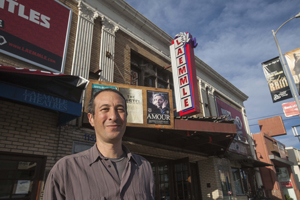The historic Laemmle Theatres art house movie chain is hoping it can cut to a happy ending after a series of rent increases forced it to leave some longtime properties.
After its latest rent squeeze, the West L.A. exhibitor will be leaving its Fallbrook Center mall location in West Hills this month, another step in a series that has decreased the number of screens operated by the chain in recent years.
President Greg Laemmle said the decision to leave the mall was in keeping with the family-owned company’s new business model, which includes purchasing its theater locations and, in some cases, even co-developing new sites.
“The question is: Can we pay the kinds of rents that the national chains can pay? The answer is no,” Laemmle said. “In reply to that, we want to be our own landlord. We are going to invest, and we’re comfortable taking on that risk.”
Theater operators often pay a percentage of revenue to their landlords. In the case of an art house like Laemmle, where both concession sales and box office receipts tend to be lower than competitors that offer more commercial fare, a landlord seeking the same money it might from an exhibitor like Regal Entertainment Group cuts much closer to the bone.
That appeared to have been part of the issue at Fallbrook Center, where the seven-screen cinema originally had been built for a larger, more commercial exhibitor. The landlord, General Growth Properties Inc., a large Chicago real estate investment trust, is used to dealing with higher-volume exhibitors, Laemmle noted. Laemmle said his chain posted revenue of $14.5 million last year.
“General Growth has malls across the entire country,” he said. “They have Cinemark and AMC theaters, and it’s going to look different when Laemmle’s there.”
A source said AMC Entertainment Inc. of Kansas City, Mo., would open a theater in the space.
Paring down
After closing in West Hills, Laemmle (pronounced Lem-lee) will operate 34 screens at seven locations, compared with 47 screens at 10 locations at its 2005 peak. It has an ownership stake in four of the seven.
Perhaps its most ambitious plan is a Glendale mixed-use retail and residential development including a five-screen theater it is undertaking with Marc Nathanson’s Mapleton/RDS Real Estate Group called the Laemmle Lofts.
The project, which may break ground later this year, will give the chain an equity stake in a project that’s not entirely reliant on box office receipts. That structure, Laemmle said, eased the way with lenders when he sought financing. It might have helped that Nathanson, chairman of Mapleton Investments in West Los Angeles, is No. 36 on the Business Journal’s list of Wealthiest Angelenos, with an estimated net worth of more than $1 billion.
“Just to build a movie theater from the ground up is an expensive proposition,” said Laemmle, who added, however, that “it’s one that, depending on the grossing potential, we feel is worthwhile.”
Partnering with deep-pocketed backers like Nathanson might be the way forward if small chains like Laemmle want to avoid the uncertainty that comes with leasing space. Without that backing, the future is less clear, because other forms of support have dried up.
In 2011, the company opened its NoHo7 theater, a $7.5 million, seven-screen project financed, in part, with funding from the now-defunct Community Redevelopment Agency of Los Angeles. The theater, at 5240 Lankershim Blvd., was a component of J.H. Snyder Co.’s North Hollywood redevelopment project. Snyder contributed land and parking for the theater as well as nearly $500,000 in development funding.
“In North Hollywood we were able to work with the CRA. It’s going to be difficult going forward to do that (since) CRAs are gone,” Laemmle said. “We’re going to have to be a little more creative and take on more risk.”
Making the jump into mixed-use development might seem outside the purview of a theater chain. But Sheldon Halpern, a lawyer at Pircher Nichols & Meeks in Los Angeles who specializes in mixed-use projects, said partnerships with firms like Snyder’s and Nathanson’s makes sense for Laemmle, and should provide it with development expertise.
By owning rather than leasing, he added, Laemmle has the freedom to make upgrades and adjustments as it sees fit, while not having to share a percentage of its revenue with a landlord, which is typical of cinema deals.
“It’s not the theater that’s putting the deal together; it’s the developer who has some expertise with mixed use,” he said. “If everything works out well, the long-term upside is with the owners.”
Still, others question the wisdom of his strategy to own locations rather than simply operate them.
“There’s no reason to own if you’re not in the real estate business,” said Michael Pachter, an analyst who follows Regal, Carmike Cinemas Inc. and Cinemark Holdings Inc. for Wedbush Securities Inc. in Los Angeles. “Rents are low. You should reinvest in profitable endeavors.”
Laemmle would not comment on specifics of his rent increases at the Fallbrook Center or other locations, and said he did view the equity investment in mixed-use properties that house his theaters as a wise investment.
“One option is to create your own mall and subsidize it with some people who will pay more,” he said. “From a financing standpoint, banks don’t value the theater rent as much as they would with other rents.”

